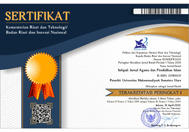The Effect of Problem Based Learning Model on Students' Analytical Thinking Ability Based on Learning Outcomes of Islamic Cultural History Subject (SKI)
Abstract
This article describes the influence of the problem-based learning model on students' analytical thinking skills based on the learning outcomes of Islamic Cultural History (SKI) subjects. The modern concept of learning requires students to be creative, responsive and active in searching, selecting and finding, analysing, concluding and reporting learning outcomes. In this study the researcher aimed to find out whether there was an influence between the independent X-variable on the Y-variable. There was a significant effect between problem-based learning on analytical thinking of eighth grade students of MTs Sarji Ar-Rasyid. The results of the analysis obtained t count 0.501 with a significant value of 0.013 which is less than a significance level of 0.05 while the value of R square = 25.1%. The magnitude of the effect of problem-based learning on the analytical thinking of eighth grade students at MTs Sarji Ar-Rasyid is 25.1%, this is shows that 74.9% of the analytical thinking of students is influenced by other factors (internal factors or external factors) that require advanced research.
Keywords
Full Text:
PDFReferences
Akrim, & Setiawan, H. R. (2022). Transformation of Islamic education curriculum development policy in the national education system. Cypriot Journal of Educational Sciences, 17(7), 2538–2552.
Arikunto, S. (2014). Prosedur Penelitian Suatu Pendekatan Praktik. Rineka cipta.
Coleman, B. D., & Fuoss, R. M. (1955). Quaternization Kinetics. I. Some Pyridine Derivatives in Tetramethylene Sulfone. Journal of the American Chemical Society, 77(21), 5472–5476. https://doi.org/10.1021/ja01626a006
Efendi, N. (2017). Implementasi metode penanaman nilai akhlak pada anak oleh orang tua siswa mts muhammadiyah masmambang kabupaten seluma. An-Nizom, 2(3), 603–604.
Mavianti, & Setiawan, H. R. (2021). Model Manajemen Pembelajaran pada Masa Pandemi. Seminar Nasional Teknologi Edukasi Sosial Dan Humaniora, 487.
Mudani, U., Abdullah, K., Azis, A., Penelitian, P., & Pendidikan, K. (2019). Efektifitas Strategi Pembelajaran Analisis Nilai terhadap Pengembangan Karakter Siswa pada Mata Pelajaran Sejarah Kebudayaan Islam. 7(1).
Muhaimin. (2009). Manajemen Pendidikan: Aplikasinya dalam Penyusunan Rencana Pengembangan Sekolah atau Madrasah. Kencana.
Nurmadiah. (2014). Konsep Manajemen Kesiswaan. AL-AFKAR Jurnal Keislaman Dan Peradaban, 3(1), 46.
Nurvitasari, N. (2022). Edusaintek: Jurnal Pendidikan, Sains dan Teknologi. 8(1), 257–267.
Riffiyanti, E. (2019). Variasi Metode Pembelajaran Sejarah Kebudayaan Islam (SKI) di MTs Miftahul Ulum Weding Bonang Demak. Jurnal Al-Fikri, 2(2), 1–10.
Sani, R. A. (2013). Inovasi Pembelajaran ( yayat sri Hayati (ed.)). Bumi Aksara.
Seituni, S. (2019). Analisis Model Pembelajaran Problem Based Learning Dalam Upaya Peningkatan Aktivitas Mahasiswa Terhadap Sikap Demokratis Pada Mata Kuliah Pendidikan Kewarganegaraan. 03(01), 95–104.
Setiawan, H. R., & Abrianto, D. (2019). Metodologi Penelitian Kualitatif. Bildung.
Sugiyono. (2015). Metode Penelitian Kombinasi (Mix Methods). Alfabeta.
Sugiyono. (2016). Metode Penelitian Kuantitatif, Kualitatif dan R&D.
Sugiyono. (2017). Metode Penelitian Kuantitatif, Kualitatif dan R&D. Alfabeta.
Yuwono, G. R., Sunarno, W., & Aminah, N. S. (2020). Pengaruh Kemampuan Berpikir Analitis Pada Pembelajaran Berbasis Masalah (Pbl) Terhadap Hasil Belajar Ranah Pengetahuan. Edusains, 12(1), 106–112. https://doi.org/10.15408/es.v12i1.11659
DOI: https://doi.org/10.30596/12142
Refbacks
- There are currently no refbacks.
Intiqad Jurnal Agama dan Pendidikan Islam is abstracting & indexing in the following databases:
View My StatsEditorial Address:
Faculty of Islamic Religion, Universitas Muhammadiyah Sumatera Utara. Jl. Mukhtar Basri No. 3 Medan 20238 Telp. (061) 6622400 ext. 27 dan 28 Fax. (061) 6625474. e-mail: intiqad@umsu.ac.id

_(1).png)























